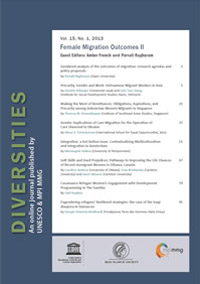Engendering refugees’ livelihood strategies: the case of the Iraqi diaspora in Damascus
by Giorgio Heinrich Neidhardt (Fondazione Terre des Hommes Italia Onlus)
To cite this article: Neidhardt, G. H. (2013). Engendering refugees’ livelihood strategies: the case of the Iraqi diaspora in Damascus. Diversities, 15(1), 95–108. https://doi.org/10.58002/3p97-7×59
This study looks at the gender dimension in Iraqis’ livelihood strategies in Syria in the period immediately before the present uprising and repression. It suggests that the lack of resources in Syria has meant that Iraqis have ‘activated’ resources elsewhere, outside Syria and outside the environment of institutional humanitarian assistance, and examines the implications of these transnational practices for Iraqi families and their networks. In the first part of this paper I analyse the characteristics of the host country, starting from the urban milieu in which the refugee communities are situated. I note the relative unimportance of ethnic and sectarian affiliation within the Iraqi diaspora in Syria, and focus on the more significant social and economic constraints on recent refugees following the enforcement by the Syrian government of stricter regulations on entry and stay, and the subsequent separation of families between Iraq and Syria. In the second part I examine the dependence of Iraqi refugees in Syria on family networks to cope with the restrictive measures of the host country on the one hand, and with the conflict in Iraq on the other, in order to comprehend how gender in the Iraqi diaspora in Syria constitutes a determining element with respect to livelihood strategies.
|
